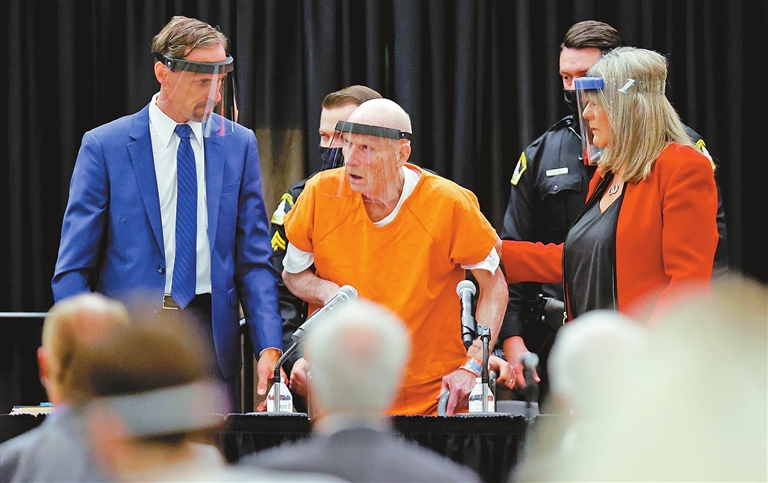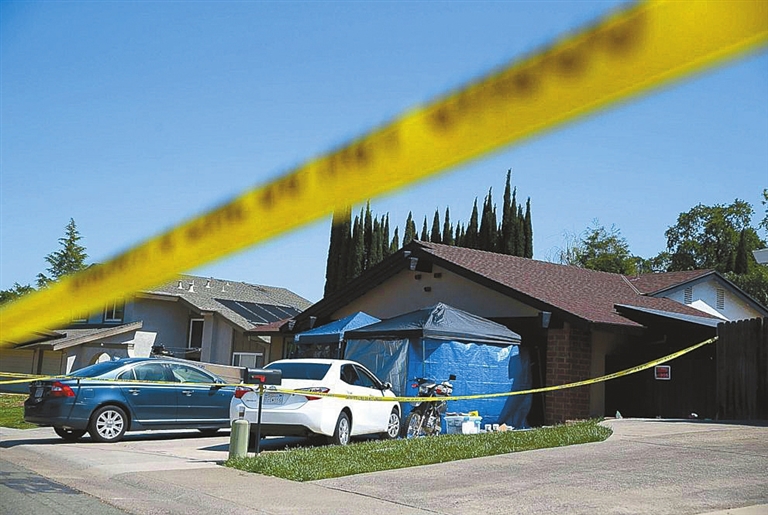

AFTER decades in the shadows, Joseph James DeAngelo Jr. confessed he is the Golden State Killer, one of the most elusive serial killers in California, the United States. On Monday, DeAngelo, 74, pleaded guilty to over two dozen charges — and admitted to many more uncharged crimes that terrified California — in the Sacramento State University Ballroom, an unusual venue needed to safely accommodate the many victims, witnesses and media with social distancing. In exchange for pleading guilty, DeAngelo will avoid the death penalty and instead spend the rest of his life in prison. He also agreed to waive his appellate rights and will pay to-be-determined restitution to his victims. A formal sentencing hearing will be held in August. As prosecutors from Ventura, Sacramento, Santa Barbara, Contra Costa, Orange, San Joaquin, Yolo, Alameda and Stanislaus counties recited the details of his murders, DeAngelo, looking disinterested, responded “guilty” to each charge. On allegations with no formal charge attached, he simply said: “I admit.” The former California police officer stalked such a wide swath of the state that he collected nicknames everywhere he went. In Central California, he was the Visalia Ransacker. In Sacramento and the Bay Area, he was the East Area Rapist. In Southern California, he was the Original Night Stalker. And, finally, he became the Golden State Killer after crime writer Michelle McNamara coined the moniker in 2013. DeAngelo’s crimes ran from at least 1973 to 1986 and involved attacks on some 106 children, men and women in 11 counties. Some 50 women and girls were raped. Because the statute of limitations expired for the rapes, prosecutors could only ask DeAngelo to admit to those crimes which he did. He also murdered at least 13 people. He admitted guilt in the first-degree murders of Brian and Katie Maggiore, Lyman and Charlene Smith, Keith and Patrice Harrington, Manuela Witthuhn, Janelle Cruz, Claude Snelling, Robert Offerman, Debra Manning, Cheri Domingo and Gregory Sanchez. After the brutal bludgeoning of Cruz in 1986, the Golden State Killer disappeared, leaving frustrated investigators chasing red herrings and dead ends for 30 more years. In his wake, DeAngelo left countless traumatized families. Along with victimizing women, he subjected husbands and boyfriends to the horror of listening to their partners being raped while they were tied up in another room. DeAngelo sometimes placed dishes on their backs, warning if he heard a plate fall, he’d kill them. Some children slept through attacks, although others awoke to the unfolding nightmare and were forced back into their rooms, alone for hours as DeAngelo roamed the house. The Golden State Killer was known for creating personal connections to victims, calling women by their first names or telling them he’d stalked them before. It’s unclear if he really had links to them, however. DeAngelo broke into victims’ homes before he attacked, giving him ample access to photos, letters and other identifying details. Investigators believe DeAngelo would case streets for days or weeks before attacking, and he’d often target a single neighborhood repeatedly before selecting a new one. In the days leading up to an attack, residents would notice family photos moved, closed doors they’d sworn they left open and scratches on window screens. The psychological terror did not end with rape. In some cases, police believe DeAngelo called his victims afterward. In one such call, a woman and children could be heard in the background, leading investigators to speculate the killer was a family man. One woman, at the request of police, kept her phone number for years in the hopes the attacker would call and reveal identifying information. Detectives did not have a final named suspect until 2018, when they used crime-scene DNA and genealogy services to identify the killer’s cousin and then, finally, DeAngelo, a former police officer. Detectives submitted the killer’s DNA to an open-source genealogy website called GEDmatch, where it found a hit with a DeAngelo relative who used the service. Detectives were then able to narrow their list of suspects, eventually arresting DeAngelo after a covertly obtained sample from his trash matched the DNA that linked so many crime scenes. Sacramento County Assistant Chief Deputy District Attorney Thien Ho called the crimes “simply staggering” in scope. “His monikers reflect the sweeping geographical impact of his crime,” Ho said during Monday’s hearing. “Each time, he escaped — slipping away silently into the night, leaving communities terrified for years.” Ho said that DeAngelo, sitting in a Sacramento County Sheriff’s Department interview room hours after his arrest, spoke to himself, saying, “I did all those things. I’ve destroyed all their lives. So now, I’ve got to pay the price.” Because of COVID-19 spacing requirements, the proceeding was moved to the ballroom at Cal State Sacramento, the school from which DeAngelo received a criminal justice degree in 1972. The audience was composed almost entirely of victims and their families, with spaces awarded by lottery for 27 members of the media. Victims have been told to prepare impact statements to be read aloud during proceedings scheduled to begin Aug. 17 and to last a week before DeAngelo’s sentence is declared. Though they weren’t able to address the court directly Monday, the victims found a way to make their presence felt. As details about the murders of Greg Sanchez and Cheri Domingo were read aloud, Cheri’s daughter Debbie Domingo stood to face DeAngelo. Jennifer Carole also stood, hands gripped behind her back, as the 1980 bedroom killings of her father and stepmother, Lyman and Charlene Smith, were described. She took off her mask so she could be seen but did not make eye contact with DeAngelo. DeAngelo’s whispery voice and use of a wheelchair did not evoke sympathy from Carole. “Rest assured, it’s still an act,” she said, echoing the opening statement by prosecutors who said DeAngelo briefly feigned insanity when arrested for shoplifting in 1979 and appeared to do so again hours after his 2018 arrest, when he blamed the crimes on someone called “Jerry.” For the last three decades, DeAngelo lived in a single-story home in Citrus Heights. During many of his crimes, he was an active duty police officer — specializing in burglary cases — in Auburn and Exeter. He was fired by Auburn Police in 1979 after a shoplifting arrest. Only in retrospect did the stolen items take on a dark significance: He’d lifted a hammer and dog repellent. Until his retirement in 2017, he worked as a truck mechanic for Save Mart in Roseville. He had a wife and three daughters, although he and his wife separated in the early 1990s. Sacramento County jail records indicate DeAngelo rarely, if ever, receives visitors. DeAngelo has been in jail since his arrest in April 2018. He will now likely die there.(SD-Agencies) | 
